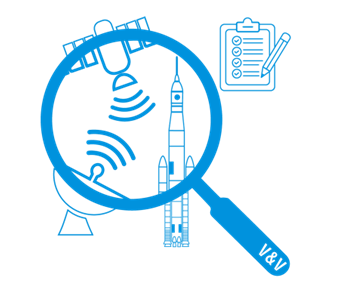Space Systems Verification and Validation Online
- This essential course provides participants with the processes, industry standards, information, and tools necessary to implement or evaluate a credible verification and validation program.
- All students will receive an AIAA Certificate of Completion at the end of the course
OVERVIEW
The Systems Verification and Validation course provides participants with the processes, industry standards, information, and tools necessary to implement or evaluate a credible verification and validation program. Emphasis is on practice over theory using a fully-functional (hardware and software) desktop (non-flight) 3U CubeSat — Satellite Learning Laboratory (SATLL) as the system of interest. Using SATLL, the course follows the logical development of the assembly, integration and verification (AIV) Plan for a hypothetical mission — NanoMet-2 – designed to deliver large scale meteorological imagery from LEO. NanoMet-2 serves as an end-to-end V&V engineering case study to examine the complete traceability from design requirements verification requirements to verification event implementation and close out. Application of MBSE tools for managing this process is highlighted. Participants are provided with key lectures and resources and asked to use these processes, tools and information to develop validation and verification plans and then implement them in a hands-on laboratory where they will learn by doing. This course is designed for test engineers, systems engineers, payload principal investigators, subsystem engineers or project managers involved in any phase of the product life cycle.
LEARNING OBJECTIVES
At the end of this course, you will be able to:
- Explain the end-to-end SE process and how it applies to system (and lower level) requirements definition, allocation, validation and verification.
- Describe the purpose and scope of key documents required in the validation and verification processes, and describe typical errors committed.
- Describe various methods of V&V, when they are appropriate, and how they are used as part of a verification plan for a system of interest
- Determine appropriate circumstances and applicability of verification methods to prototype and proto-flight systems.
- Analyze representative verification plans, test sequences and activities for an example system of interest (spacecraft).
- Develop, evaluate and implement a master verification plan for a space system including hardware, software and associated ground support equipment (GSE).
- Apply processes and techniques in a hands-on workshop associated with a system of interest.
- Use applicable NASA, ECSS, DoD and Industry Standards and lessons learned to support system V&V decisions and activities.
AUDIENCE: Systems engineers, payload principal investigators, subsystem engineers, project managers, program managers, quality assurance managers, and any other stakeholders involved in the application of verification and validation for space systems.
COURSE INFORMATION
Type of Course: Instructor-Led Short Course
Course Level: Fundamentals – Intermediate
Course Length: 3 days
AIAA CEU’s available: Yes
TOPICS
- Intro to Space Systems Engineering
- The NanoMET-2 System of Interest
- Validating Requirements & Models
- Preparing for Product Verification 1
- Verification for the Launch & Space Environment
- Environmental Test Venues
- Preparing for Product Verification 2
- Implementing Product Verification
- Software Verification & Validation
- V&V of COTS
- Validating Products and Flight Certification
- Integrated hands-on exercises throughout
INSTRUCTORS
Dr. Jerry Jon Sellers is the author of Understanding Space: An Introduction to Astronautics and is a contributing author and editor of Applied Space Systems Engineering, author of the new chapter in ASSE on Applied Model-based Systems Engineering, as well as a contributing author of Human Spaceflight Analysis and Design. He has over 30 years of space systems experience including Guidance & On-board Navigation Officer in Space Shuttle Mission Control; Assistant Professor of Astronautics at the U.S. Air Force Academy; and Chief of Astronautics for the Air Force European Office of Aerospace Research & Development. He is an Associate Fellow at AIAA and the former Chairman of the AIAA Space Systems Technical Committee. He is an elected member of the International Academy of Astronautics and is a Certified Scaled-Agile Program Consultant. He is also an adjunct professor at Stevens Institute of Technology and certified Scaled-Agile Framework (SAFe) Program Consultant (SPC5). Jerry is an elected member of the International Academy of Astronautics.
Dr. Peter Van Wirt is a former Deputy Department Head for Labs and Research of the Department of Astronautics at the U.S. Air Force Academy. He has been a visiting lecturer for the Technical University of Delft’s SpaceTech Master’s Degree in Space Systems Engineering and is an Adjunct Professor for the Space Systems Engineering Master’s program at Stevens Institute of Technology. He also instructs at the National Security Space Institute in Colorado Springs, CO. He has served as a systems engineer/program manager for a variety of US Air Force engineering developments. Peter has over 30 years of aerospace engineering experience and over 20 years teaching experience. He earned his doctorate at Utah State University.
AIAA Training Links
-
For information, group discounts,
and private course pricing, contact:
Lisa Le, Education Specialist ([email protected])

